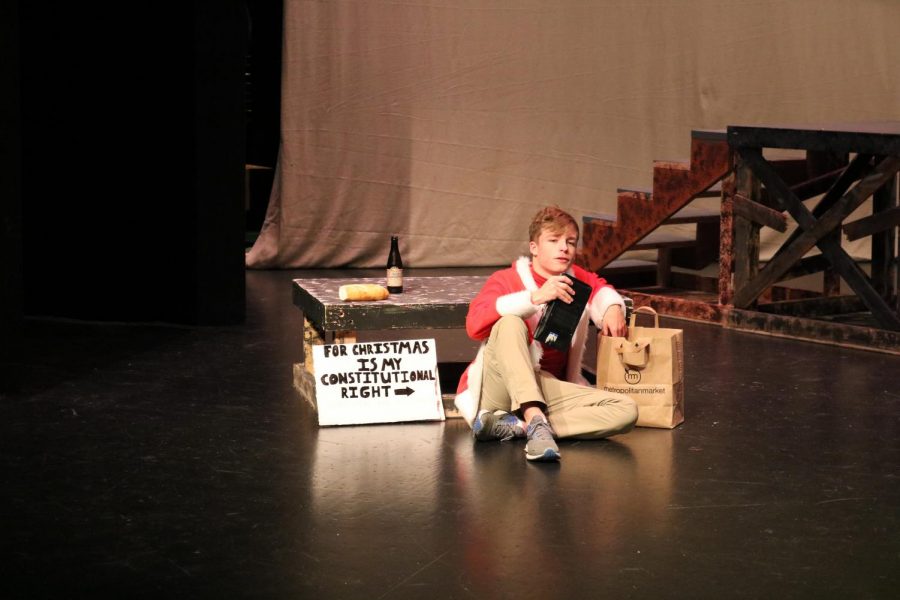Making a Musical
What it takes before the curtains open for a production to succeed
Photo: Ian Lee
Senior John Higley plays one of the titular characters in the musical. He is the would- be assassin Samuel Byck. The musical features the stories of the nine assassins who have attempted or committed the murder of a United States president.
This semester, the University Prep Play Production and Stagecraft classes, will be putting on a performance of Assassins, a musical featuring stories about the presidential assassins of America’s past, successful and unsuccessful.
A lot goes on behind the scenes, from selecting the musical to dress rehearsals, prior to the first performance in front of a crowd.
Theater Manager and Director Paul Fleming follows a set process to select each year’s musical.
“We look at shows of a certain style, get it down to three shows, then use class enrollment to select the final one. That’s done in like April or May,” Fleming said.
After selecting a show, Fleming gets familiar with it.
“I get to know the show over the summer. If it’s a musical, that can include listening to the music a lot, getting familiar with the script and getting a sense of what I want to do with it,” Fleming said.
Fleming also takes care that UPrep puts on different styles of shows.
“I try to have a different style of show every year. The students who are here over a four year period are exposed to four different kinds of plays, both for the musical and the non-musical,” Fleming said.
To make a complicated production occur, time must be blocked out.
“The first two weeks are casting, the next 10 weeks are rehearsal. Then, we get into the final run throughs the week before we open,” Fleming said.
For stagecraft, the timeline is different. First is the designing and building stage and the assignment of roles.
“After the scenery is built, we assign roles for stagecraft. Typically that is two weeks before,” Fleming said.
There are a variety of roles that make up stagecraft, from usher to stage manager.
Participating in the musical can really affect students’ schedules.
“The time commitment is larger than other things. You have to treat it like a sport. It’s from three to six everyday. You’re not called every time, but it’s a lot,”senior and Play Production student Jake Zikan said.
Stagecraft, however, is less intense.
“Stagecraft is less of a time commitment than play production. We only have one week, tech week, where we have to be at rehearsals,” said sophomore and Stagecraft student Frank Higley.
The budget is an important part of a production.
“For a musical, it’s between a thousand and two thousand dollars just for royalties and scripts,” Fleming said. “There’s a thousand to two thousand dollar stagecraft budget, I spent a thousand dollars on lumber for this show.”
Considering the topic the show adresses, Fleming wants to have a conversation about it.
“We want to have a lot of discussion about this show. It’s not a light musical comedy.” Fleming said.
The first performance of the musical will be on Nov. 15th at 4:00 pm.
What is “Assassins” About?
“Assassins” is a musical by lyricist-composer Stephen Sondheim and librettist John Weidman, about the nine attempts to assasinate political figures in American history. It first opened at Playwrights Horizons in New York on January 27th, 1991. Adapted to a typical musical format, “Assassins” gives the points of view of the nine characters. Their disturbing thoughts and ideas are revealed through lively song and dance. Overcoming the barriers of time and space, the assassins converse with each other, explaining their actions, all with a twist of dark humor. They evolve into a chorus, brought together by their dastardly motivations. As the musical progresses, the individual assassins awaken to their collective identity, and come to personify an the darker side of the American dream where anybody can grow up to kill a President.
Information provided by Director Paul Fleming
Your donation will support the student journalists of UPrep.

